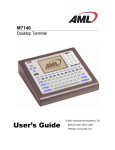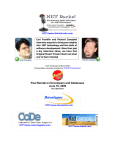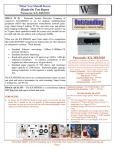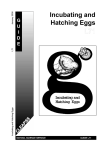Download Rocky Lhotka is CSLA and More October 26, 2010
Transcript
HTTP://www.dotnetrocks.com Carl Franklin and Richard Campbell interview experts to bring you insights into .NET technology and the state of software development. More than just a dry interview show, we have fun! Original Music! Prizes! Check out what you've been missing! Text Transcript of Show #605 (Transcription services provided by PWOP Productions) Rocky Lhotka is CSLA and More October 26, 2010 Our Sponsor HTTP://www.telerik.com/ Rocky Lhotka is CSLA and More October 26, 2010 Lawrence Ryan: .NET R o c k s ! episode #605, with guest Rocky Lhotka, recorded live Monday, June 28, 2010. [Music] Rocky Lhotka: That everything that can be said has been said. Is that the...? Carl Franklin: No, no, no. I'm sure you'll bring some fresh perspective to these topics. Lawrence Ryan: This episode is brought to you by Telerik, by Haystack a n d b y Franklins.NET Training Developers to Work Smarter and now offering video training on Silverlight 4.0 with Billy Hollis and SharePoint 2010 with Sahil Malik, order online now at franklins.net. And now, here's Carl and Richard. Carl Franklin: Hey, this is Carl Franklin and Richard Campbell. We're here doing the last show of the .NET Rocks! Live Weekend and we're talking with Mr. Rocky Lhotka. Hey, Rocky. Rocky Lhotka: Hey, how is it going? Carl Franklin: It's going well. How are you? Rocky Lhotka: I'm doing great. Carl Franklin: Well, we have spent the whole weekend talking about every possible permutation of every possible .NET technology and every issue that we can possibly think of. So I don't even know where to start, Richard. I just want to talk to Rocky about, you know, Minnesota or something. Richard Campbell: You know what? Rocky knows a lot about Silverlight. Carl Franklin: He does. Richard Campbell: He is a Silverlight fan. Rocky Lhotka: Well, I think that certainly the topics you just listed are key things that I'm giving a lot of thought to. As you've mentioned I'm a big fan of Silverlight and I've put a lot of time and energy in the Silverlight and I think it's very exciting and very cool. At the same I think that Microsoft is smart in hedging their bets by supporting HTML 5.0. That's actually how I view it. I'm sure it's not politically correct. Carl Franklin: what I'm feeling too. Rocky Lhotka: But it seems to me like... Well, you can't go wrong because there's always going to be some set of web developments where Silverlight isn't appropriate for some reason or another, things like needing to run on the iPod or other close environments like that and so then HTML becomes a big deal, but even then HTML 5.0 seems a little dicey and that is it won't be a common denominator for years just based on the way that HTML has evolved over the years. So I'm still really hopeful that Silverlight catches on it and people get excited about Silverlight the way I am. Richard Campbell: And it does seem like it is catching on. We've seen more apps built that way and you can't argue with Silverlight 4.0's ability to go in and out of the browser and now on Win Phone 7.0. That's finally three screens. Carl Franklin: Carl Franklin: Not only does he know a lot about Silverlight, but he knows a lot about systems in general and I'm sure you've got some opinions on the Windows Phone 7.0 and HTML 5.0 and what have been our other topics, hot topics this weekend. We've talked a little bit about Microsoft and their, what is it? The counter law suit from... Richard Campbell: SalesForce. Carl Franklin: SalesForce, you know. talked a little bit about patents. Richard Campbell: map. We Yeah. No, that's pretty close to Certainly a... Rocky Lhotka: Not just Windows Phone but also the Windows embedded platforms. Right? Richard Campbell: Right, of course. Well, and I think it's one of the questions we have floating around which I don't believe we've actually had answered, it's whether or not the mobile team is just going to make Silverlight a standard development tool for all of the embedded stuff so that everybody, you know, it doesn't matter whether you're building a barcode scanner or an RFID reader or anything. It should be able to work in Silverlight. Maybe we've been all over the Carl Franklin: We've been all over the map. Is Silverlight going to work on the phone? Man, I just don't know where to start, Rocky. Maybe you could just pick something. What are you thinking about these days? Transcription by PWOP Productions, http://www.pwop.com Rocky Lhotka: Yeah. And I think for all that, arguably there's not -- you know, Microsoft has never been great at the cross-platform story. Richard Campbell: Right. Page 2 of 18 Rocky Lhotka is CSLA and More October 26, 2010 Rocky Lhotka: But Silverlight, by far, is the most cross-platform that we've seen other than maybe some old C++ compilers from the '90s or something. Richard Campbell: Yeah. Tim here was talking about the fact that Microsoft is committed to putting Silverlight on a set-top box for Motorola which is best, pretty cool. Carl Franklin: Yeah. Richard Campbell: We're starting to see this showing up in more places. Rocky Lhotka: Yeah, I think and that's where really like you said the three screens. If we get PCs, Macs, your average browser-based and PC-based world, and then you get phones, and then you get smaller dedicated devices like set-top boxes, hopefully either Microsoft or hardware vendors come up with a nice compelling tablet story around Windows but really I would hope that any story there would be centered on Silverlight 2.0. Carl Franklin: Rocky, what's the story with Silverlight 4.0 and COM interop? Rocky Lhotka: My understanding and having not spent the time to go try it, my understanding is that if you're running out of browser and you check the full trust box that you can do COM interop. Carl Franklin: Now do COM interop, that's quite a lot of exposure. Does that mean any COM object that can be created on the machine? Rocky Lhotka: Well, and that's where I'm going to become somewhat skeptical. Carl Franklin: Yeah, I'm a bit skeptical myself because all you really need to do to have any kind of access to anything is write a .NET object and wrap it in a COM Callable Wrapper. Rocky Lhotka: Well, and that part I suspect will work. I think that my understanding again is that Microsoft's primary target with that was Office. Carl Franklin: Yeah. Rocky Lhotka: And if you think back into the murky days of COM or I suppose some people would view them as the glittering golden days of COM. Carl Franklin: Well, Don Box would anyway... Rocky Lhotka: But I'll stick with murky. There were really two kinds of COM. There was the VB kind that Office in VB had. Transcription by PWOP Productions, http://www.pwop.com Carl Franklin: Right. Rocky Lhotka: And then there is the rest of it that you could do all sorts of really interesting/weird stuff with C++. My guess is that it's only the Officefriendly VB style COM that you can use but that's most of it. Carl Franklin: That's most of it. I mean, the fact is that if I've got something that Silverlight doesn't support, I can maybe wrap it up in a COM object. Now the things -- I've done a little research on this, they also say, they throw around the word P/Invoke too and I looked everywhere, Rocky, I couldn't find one single example of calling the Windows API from Silverlight. Rocky Lhotka: Yeah, I've not seen any. Carl Franklin: P/Invoke. B u t I 've seen that term, Rocky Lhotka: But you know, at least from my part, I can't remember the last time I did a P/Invoke in .NET. Carl Franklin: Well, actually I have something that I want to do that I can only do with a COM object and only do with a Win API call. Could I remember what it is for the life of me now after talking for 94 hours straight or however many hours, 72 hours? No. But I do remember going and looking for any kind of demo or any kind of thing that definitely said it was possible and I could not find anything. Then the other thing that I remember seeing was, well, the COM object has to exist already on the system but why couldn't I write some sort of ClickOnce installer for the COM object and then, you know. Again, if I'm using a COM object, I'm locking myself down the Windows. I understand that, but I could make some sort of call out to register the COM object. I'm just wondering if there's a really graceful elegant way to just simply include COM objects with your Silverlight application and make it work. Rocky Lhotka: No, I don't think so. I think you've got to have some installer one way or another to get them out there and I don't know that ClickOnce is a great answer because of the COM registration requirements. Carl Franklin: Oh, I remember what it was now. It was a library that did on the fly MP3 encoding because you don't get access to the Codecs in Silverlight. Rocky Lhotka: So that's interesting because a few months ago I did an informal poll inside of Page 3 of 18 Rocky Lhotka is CSLA and More October 26, 2010 Magenic as to how many people do, basically how many people step outside of .NET. Carl Franklin: Yeah. Rocky Lhotka: That have to do P/Invokes or COM interaction, and it was a pretty small percentage of our overall consulting base and the reasons primarily or the single biggest reason was Office. The second biggest reason, and that was a very close second, was to deal with legacy DLL's that have existed. Some client has had a DLL for the last 20 years and they're not going to update it because they never have but yet they still need it. So then you've got a P/Invoke scenario. Carl Franklin: And that's exactly my scenario. There aren't really any – there is no managed code, MP3 encoder on the internet as far as I can tell and I spent hours and hours and hours looking for one. But there are things that have been converted and ported and are available as COM objects so you would have to first run some sort of ClickOnce application to install the COM object and then you could run the Silverlight thing and the reason I was thinking of that was to be able to -- wouldn't it be great to just be able to have a Silverlight application come up when you want to send a message to somebody and just push the talk, push the button to talk or maybe even record your web cam or whatever and just fire that all off to somebody, capture it and fire it off. Richard Campbell: Guys, I remember Brian Noyce telling us that Silverlight 4.0 doesn't have full trust. It has elevated trust. Carl Franklin: Richard Campbell: Yeah. P/Invoke is full trust. Carl Franklin: matter. And so is COM access for that Rocky Lhotka: Right? Oh, it's a clear gateway though. Richard Campbell: Yeah. Rocky Lhotka: If you want to create a COM component that wraps your MP3 encoder... Richard Campbell: Yeah. Rocky Lhotka: You should be able to do that. Richard Campbell: You should be able to invoke it. You just got to get that COM component on to the destination machine. Carl Franklin: Right. Richard Campbell: And that would be the tricky bit. Carl Franklin: Well, you know, a ClickOnce app would do that pretty easily. Yup. Yeah, it is elevated trust. Richard Campbell: So I've gone to the docs now, off the Silverlight, .NET site, and this is what it says. In trust mode, in the elevated trust mode, you can read and write to a user's My Documents, My Music, My Pictures, and My Video's folder and you can run desktop programs including Office. For example, you're requesting Outlook to send an email or send a report to Word or data to Excel; you could do COM automation to enable access to devices and other system capabilities by calling into application components for instance accessing a USB security card reader. Some group policies can be configured to support with elevated trust, better keyboard support, enhancements in networking you so don't need policy files and some custom chroming. So yeah, it's elevated trust. It's not full. There's no way there's P/Invoke in this. Carl Franklin: That's what I think. Richard Campbell: Well, you know, I like the way that Rocky described it. Richard Campbell: Carl Franklin: P/Invoke is essentially full trust. Yeah. It didn't fix... Carl Franklin: Click here and then it's done. You know, a pretty easy installation but... Richard Campbell: Well, it's all... Carl Franklin: But yeah, so with the web cam support in Silverlight 4.0 you do have access to the raw data like you can get the raw audio data and you can get the raw video data. Have you ever seen an uncompress AVI file? Yeah, exactly. It's not exactly internet friendly. Richard Campbell: friendly. It's not exactly hard drive Carl Franklin: Yeah, exactly. Yeah. I mean essentially if you've got one of these smaller SSD hard drives now, you'll fill that up very quick. Richard Campbell: Yeah, in no time at all. Richard Campbell: I don't see that. I mean, just look at the description here. Transcription by PWOP Productions, http://www.pwop.com Page 4 of 18 Rocky Lhotka is CSLA and More October 26, 2010 Rocky Lhotka: But I wonder if this isn't just a temporary issue because you already were seeing 3D gaming engines and other interesting... Rocky Lhotka: So I've played around a little bit with the emulator and then I'm just kind of biding my time. I'm working on getting CSLA 4.0 wrapped up. Carl Franklin: Richard Campbell: Nice. Carl Franklin: Very cool. Yeah. Rocky Lhotka: There are pretty intensive thing that are getting ported or written in Silverlight. Richard Campbell: Uh-hmm. Rocky Lhotka: I've got to believe at least for your barring licensing issues that it's just a matter of time before we start to see a lot of other things like Codecs coming in. Rocky Lhotka: And that would be within the next couple of three weeks and then the next high priority for me is actually to get a CSLA working on the phone. Richard Campbell: So actually getting the classes running on the phone? Carl Franklin: I think you're right and I'm actually pretty sure base on some -- you know when you have conversations with people from Microsoft and the say "N o w I 'm not saying anything but Microsoft, it would be probably a pretty good idea for them to do that. Don't you think?" So I'm pretty confident that that's coming. I can't think of a good reason why they wouldn't give you access to that. Rocky Lhotka: Absolutely. Richard Campbell: Wow. Richard Campbell: Richard Campbell: Sure. Carl Franklin: Especially if they've got web cam support and all you can do is show it. So I can't see myself. Why not install a mirror? Richard Campbell: You could do that? Silverlight does mirrors? That's cool. Carl Franklin: application. Yeah. I wrote a Rocky Lhotka: It was video distortion in fact. Carl Franklin: Yeah. Richard Campbell: There you go. Carl Franklin: Let me run this app. I need a mirror, I can't find one. Rocky Lhotka: And it looks like it should work with relative -- you know, there's a few Silverlight specific or desktop Silverlight specific especially UI widget things I've got. Rocky Lhotka: They just don't translate but most of it is just going to work from what I can see. Richard Campbell: This makes me happy. It makes me happy when Rocky Lhotka takes on a technology. It's like one of the best validations I could hope for. If Rocky likes it, it must be good. mirror Carl Franklin: Richard Campbell: Rocky, any playing around with the Windows Phone 7.0 emulator because I know you don't have a phone. I wish I had a phone. Richard Campbell: Nobody has a phone. Rocky Lhotka: But nobody has a phone. Richard Campbell: Yeah. Transcription by PWOP Productions, http://www.pwop.com Yeah. Rocky Lhotka: I'm excited. I think from a technology perspective, it's just all happiness. Richard Campbell: Rocky Lhotka: Right. Yeah, it's pretty exciting. Rocky Lhotka: From a business perspective it's interesting because why do people create phone apps? You know, they create phone apps. Most people anyway, they have to reach a wide audience like the web. Richard Campbell: Yes. Rocky Lhotka: And so the Windows Phone is very compelling from my perspective as a developer. But if I'm a business person, it's going to be one player among many for some time to come. Richard Campbell: Yeah. And I like the idea of CSLA being added to that equation because now you can just extend that app onto the phone as well. I think that we've been waiting for a really great smart phone solution to make our enterprise apps just be Page 5 of 18 Rocky Lhotka is CSLA and More October 26, 2010 part of the equation. Windows Mobile up to now has been way too hard and heaven forbid, if you try and do it with an iPhone I hear enterprise developers screaming from here. There has not been a good solution and this is. If it actually works the way it's supposed to, it's a stunning solution. Rocky Lhotka: Yes. I think Microsoft needs to come up with a compelling enterprise deployment story. Richard Campbell: Yeah. Rocky Lhotka: So if I build a really cool app, and inside Magenic we've talked about this too, we could have some really nice apps even for our own consumption managing consulting schedules and workloads and a variety of stuff. Richard Campbell: Carl Franklin: This portion of .NET Rocks! is brought to you by our good friends at Telerik. We've been blown away by the uptake in the quick adaption of Silverlight. It's no secret though that the platform didn't provide for consistent integration with the Web Analytics Services. Well, not anymore. As you might have already heard, Microsoft announced the Silverlight Analytics Framework which solves the abovementioned problem. But what's also interesting is that Telerik already provides support for the framework. Telerik is the first UI components vendor to offer handlers for the Silverlight Analytics Framework. Using RadControls for Silverlight, you can immediately benefit from the advantages of the platform and start tracking the statistics of your applications. You can read details and download the handlers at telerik.com/silverlight. And hey, don't forget to thank Telerik for supporting .NET Rocks! on their Facebook fan page, facebook.com/telerik. Sure. Carl Franklin: Yeah. Workflow especially having to get okays and approvals I can imagine being really, really cool in the phone. What would be really cool is if I can see deployment being pushed all the way to the phone from a server where the apps just install themselves in your enterprise. Rocky Lhotka: Rocky Lhotka: Absolutely. Yes. Carl Franklin: You know, you're in a meeting, the little thing pops up, click yes or no, okay. Carl Franklin: I mean if you're truly using the phone for work, then why not? Rocky Lhotka: Well, and a lot of us has of course done through Outlook now but it could be automated in some really interesting ways that's predicated on being able to do some sort of enterprise deployment so only Magenic people gets this thing. Rocky Lhotka: Well, it does seem like a variation on the marketplace except that it was almost, yeah, it would be some certificate-protected server that your company would put up. Richard Campbell: Richard Campbell: Yeah. I got to hope that Microsoft is not going to do what Apple did and leave them in a lurch for years. Rocky Lhotka: Uh-hmm. Richard Campbell: It's also not their way. I mean, they're generally pretty good to the enterprise and this is not a hard problem. This is just not a hard problem. An implementation of ClickOnce that runs on the phone so that I can deploy ClickOnce server with an app on it would be all I need. Rocky Lhotka: Yeah. But I don't honestly expect to see it in the first release either. I really suspect that it will. Whatever kind of answer comes from this problem will probably be on in the next year or something. Richard Campbell: Yeah. I know they have been totally consumer-centric up until now but the enterprise story is pretty darn compelling so I just hope they don't ignore us for very long. Rocky Lhotka: And whatever is on the server would automatically roll out to everybody's phone. Carl Franklin: Right. So you just wake up in the morning, whatever, there's a new app on your phone. Actually go to lunch, you know. Rocky Lhotka: Yeah. That seems like a kind of story you'd want to have. Carl Franklin: Yup. And updates too. Richard Campbell: You can make that pretty painless if you just have the ability to join a domain which I mean Mobile 6.5 phones can join a domain. I don't know if the Mobile 7.0 once can. I've never asked that question. Can I join it to a domain? Because the moment I have it joined to a domain, you pretty much got all the credentials you need to say, yeah, this is one of my phones, go ahead and install the app. Carl Franklin: Transcription by PWOP Productions, http://www.pwop.com Uh-hmm. Uh-hmm. Page 6 of 18 Rocky Lhotka is CSLA and More October 26, 2010 Richard Campbell: Interesting. Well, what else? What have we got to do? CSLA 4.0. So you've rewritten everything in VB.NET? Rocky Lhotka: Yeah, absolutely. Richard Campbell: Nice. Rocky Lhotka: anywhere. C# Carl Franklin: Yeah, so bad. Richard Campbell: Yeah, it's just a passing thing. clearly is not going Rocky Lhotka: Sadly the VB version of CSLA went away a couple of years ago. Richard Campbell: Rocky Lhotka: Well, that's true. I'm not saying that it doesn't work with VB applications. Why wouldn't it? Rocky Lhotka: I'm saying that I no longer maintain the source code twice. Carl Franklin: Oh, oh, okay. Yeah, I don't think that's a deal breaker for anybody really. Richard Campbell: No. Rocky Lhotka: No. If that's a deal breaker, then they have give up .NET because most of it is written in C# too. Carl Franklin: Rocky Lhotka: For me. Richard Campbell: Yeah. Rocky Lhotka: The amount of code to write something in C# is easy and the amount of code to do the same thing in VB was several times more lines of code. Richard Campbell: Wow. Rocky Lhotka: Now VB 10.0 adds that feature. Richard Campbell: Right. Rocky Lhotka: and do it. So technically I could go back Richard Campbell: Oh, boy. You could catch up. You had nothing else to do. Rocky Lhotka: But like I really want to... You know, two years worth of effort. Carl Franklin: I'd rather you concentrate on features for the phone. Richard Campbell: Yeah. Rocky Lhotka: Yeah. Me too. Richard Campbell: Now the version number is actually in sync with the .NET releases. Is that how we end up in CSLA 4.0. Rocky Lhotka: That's correct. Richard Campbell: organized. How about that. Carl Franklin: Everybody is all is 4'd out. Richard Campbell: They're all lined up on 4.0. Rocky Lhotka: Yup. Carl Franklin: Yeah. He is so Yeah. Rocky Lhotka: I know it's frustrating for people that use the CSLA source code base as a learning tool. Richard Campbell: For you. Yes. Carl Franklin: What do you mean by that? I thought you were offering compiled dll's here. Carl Franklin: Richard Campbell: Yup. Rocky Lhotka: I fully appreciate the loss there, but at the same time it's a lot of work to maintain everything twice. Richard Campbell: So is this really the build that's all about .NET 4.0 and Studio 2010? Richard Campbell: Rocky Lhotka: Yeah. Rocky Lhotka: And then when Silverlight came along with all of its async behaviors, the language feature called multi-Lambdas that was in C# and not in VB, that was a deal breaker. Transcription by PWOP Productions, http://www.pwop.com Yes. Richard Campbell: Brilliant. So I got to ask like big changes, like what did you find in moving up to the new tools? Page 7 of 18 Rocky Lhotka is CSLA and More October 26, 2010 Rocky Lhotka: Well, believe it or not there are very few changes in CSLA that were forced to buy .NET this time. Richard Campbell: Right. Rocky Lhotka: .NET 2.0 gave us generics and that was a huge change for CSLA. Richard Campbell: Uh-hmm. Rocky Lhotka: You know, 3.5 give us the Entity Framework and then somewhere in here we get ASP MVC, but a lot of those changes already existed to some degree. Silverlight was a couple of years ago now. All of these were things where Microsoft changed things that force me to do pretty radical stuff. Richard Campbell: Right. Rocky Lhotka: This time around a lot of the bigger changes are driven based on CSLA users giving me feedback about what they wish that it would do. Richard Campbell: Oh, I see. Rocky Lhotka: And so there are some really substantial changes but they're like extending the, or replacing the business rule engine... Carl Franklin: And it just worked. Rocky Lhotka: The .NET part almost just work. Basically, you can almost take 3.8 and compile it into 4.0 with minor tweaks. Silverlight was a little bit harder because they change some of the ways that WCF read its configuration. Richard Campbell: Oh, I see. Rocky Lhotka: sense to me. In ways that honestly makes no Carl Franklin: Wow. Rocky Lhotka: cards you deal. But you know, you always like Yeah. Rocky Lhotka: .NET 3.0 gave us WPF and WCF and so that was a really big change. I mean, deeper than you would at first think because the data binding in XAML is different from Windows Forms. Richard Campbell: Richard Campbell: Richard Campbell: Right. It's not like we actually broke anything which is actually damaging. It's just different and not necessarily better. Rocky Lhotka: Exactly. Yeah, my app doesn't run. Now they want the Silverlight 4.0. I don't know why. Oh, I'll tweak the -- my config file doesn't look like the new kind. Carl Franklin: Well, yeah. You know, that's what so much of development is now. So many times we don't know what the real problem is. Richard Campbell: something. Or why they change Carl Franklin: We don't care. We just know that doing this gives us happy noises. Richard Campbell: Makes it work again. Carl Franklin: Hell if I know. That's right. What did you do? Oh. Rocky Lhotka: To be much, much more powerful and simpler, both. The same with the authorization engine so it's possible to do a lot of things like shared tenant hosting that were pretty difficult if not impossible with 4.0. There are some nice new scenarios, but again they have less to do with .NET technology changes than they do with what people have been asking for. Richard Campbell: Should we actually moved\ to everything in CSLA up to the .NET 4.0 Framework or are you using the side-by-side execution? Rocky Lhotka: So many of these people, including me, run on different kinds of deadlines. Richard Campbell: Rocky Lhotka: And when you do have time to research it, sometimes it's fun to know but sometimes you just do whatever you have to do to make it work too. Carl Franklin: Rocky Lhotka: Silverlight 4.0. No. Everything is .NET 4.0 or Richard Campbell: Nice. Rocky Lhotka: Yup. Transcription by PWOP Productions, http://www.pwop.com Right. Yeah. Richard Campbell: Yeah. And it sounds like this is one of those times, just a new configuration format redesign to it, it works. Rocky Lhotka: Yeah, yeah. But it is kind of -you know, overall it's a nice story because CSLA has Page 8 of 18 Rocky Lhotka is CSLA and More October 26, 2010 a pretty big code base and of course it's complex because it goes very deep in its use of reflection, dynamic types, a whole bunch of things. So the fact that it upgraded, it's moving as it did, is pretty nice. Carl Franklin: Yeah. Rocky Lhotka: At first I was doing t h e upgrades back before .NET 4.0 and Visual Studio were released. Richard Campbell: Right. Rocky Lhotka: That didn't help either. Carl Franklin: Yeah. Richard Campbell: Playing with beta bits. Rocky Lhotka: To be fair to Microsoft, yeah, if I'm running into snafus because I'm using beta bits, that's not really their problem. Richard Campbell: No, it's not their fault. Well, it only makes sense. Any other hints or tricks, things you run into. Of course, you had me thinking if you have trouble going through Silverlight 3.0 to Silverlight 4.0, you can go compare that to going from really Studio 9.0 to Studio 10, they're much more mature products. Rocky Lhotka: Rocky Lhotka: Well, yeah, if you count all of the point releases which I think you should. Yeah. I think you should. Rocky Lhotka: Then yes, .NET itself is very much mature. Visual Studio has had a number of releases and of course this was a big one. Right? Richard Campbell: No, I don't. Carl Franklin: Well, what am I thinking of then? I mean, I know that you're into radio. Oh, maybe that you're listening to a radio show. Rocky Lhotka: That's true. I love radio plays. Carl Franklin: what I remember. That's it, radio dramas. That's Rocky Lhotka: Yeah. Carl Franklin: told us about once? What was the program that you Rocky Lhotka: The one I think I was telling you about is something called The Adventures of Ruby. Carl Franklin: to me. Yes, yes. It's all coming back Rocky Lhotka: out in Boston. Which is the ZBS production Carl Franklin: Yeah. Richard Campbell: Is Ruby a girl or is Ruby a programming language? Yeah. Richard Campbell: This is actually the sixth or seventh version of .NET. Richard Campbell: Rocky Lhotka: Yeah. Rocky Lhotka: galactic gumshoe. Ah, Ruby is a girl. Ruby is a Richard Campbell: Nice. Carl Franklin: Nice. Rocky Lhotka: I think they're probably up to Ruby 6.0 or 6.5 now. Richard Campbell: Wow. Rocky Lhotka: my favorites. And Ruby 1.0, 1.0 and 3.0 are Rocky Lhotka: Because they change so much of the actual tool they run on WPF. Carl Franklin: So would you rather listen to radio drama than read a book? Richard Campbell: Rocky Lhotka: that's a tough one. Oh, I love to read though. So Rocky Lhotka: You know, 2008 in comparison seems like a much smaller shift. Carl Franklin: Yeah. Richard Campbell: without a doubt. Rocky Lhotka: No, I think I prefer reading, but a well done radio drama is really hard to turn down. Yes. Very minor in comparison Carl Franklin: Rocky, did I correctly that you have a radio show? remember Transcription by PWOP Productions, http://www.pwop.com Richard Campbell: Yeah. Page 9 of 18 Rocky Lhotka is CSLA and More October 26, 2010 Rocky Lhotka: I've got almost -- I think maybe all The Shadows are close. I've got all the Dragnets, all the Ruby's. Richard Campbell: Rocky Lhotka: And, you know, they do the foley, they do the voices, everything is done completely live and broadcast over actual airways. The classics. Rocky Lhotka: We've got quite a collection on The Shadow. Is that how you say that? Richard Campbell: Uh-hmm. Carl Franklin: Yeah, yeah. Rocky Lhotka: So a lot of -- we've got quite a collection of radio plays around our house. Carl Franklin: Yeah. Richard Campbell: Far out. Rocky Lhotka: amazing and fun. Right as it goes which is really Carl Franklin: Garrison Keillor from St. Paul too, that's not too far from you I'm sure. Rocky Lhotka: or do a show. Right, yup. I've seen him speak Rocky Lhotka: My youngest son is a fanatic. He listens to them almost constantly. Carl Franklin: it? Yeah. You've been out to see Carl Franklin: Theater of the Mind. Rocky Lhotka: Yeah. That's a blast. Richard Campbell: interesting. Yeah, Carl Franklin: Yeah. Richard Campbell: Who knows what lurks in...? yeah. It's v e r y Carl Franklin: That's good stuff. So the reason I asked this is because this whole weekend was an experiment really in radio and we've never done the whole live thing as much as people think we do. When somebody tells me "What do you do?" and I say "Internet radio," "Oh. When is your show on?" Well, it's always on. Rocky Lhotka: It's fun in person or more than what it sounds like on the radio. Carl Franklin: Yeah, I've seen it a couple of times. It really is fun because they're so dead pan when they do their thing especially the sound effects guys. Richard Campbell: Yeah. Whenever you want it. Rocky Lhotka: And just last week I got to go see a live recording of Wait, Wait, Don't Tell Me. Rocky Lhotka: That's true. Richard Campbell: Oh, wow. Carl Franklin: No. You went to one of those? Rocky Lhotka: Minneapolis. Yeah. Richard Campbell: Awesome. Carl Franklin: Oh, wow. Carl Franklin: Whenever you want it really, but I really love the idea of being live and having people listening and partaking and sharing in that experience. There's a special community that can happen and video doesn't do it. Rocky Lhotka: It's not the same. Carl Franklin: It's not the same. They came to Rocky Lhotka: This weekend in fact, I think in three days here in Minneapolis there's a science fiction convention called Convergence. Rocky Lhotka: And talk about fun. I mean, that really is more fun in person because they recorded over 90 minutes of content and then edit it back to fit it into their programs. Richard Campbell: Richard Campbell: Wow. Carl Franklin: Yeah. Richard Campbell: Which is a lot more. Oh, yeah. Rocky Lhotka: A n d i t opens with the Mark Time Radio Awards and a live hour-long radio drama that's performed, literally performed on stage in front of the audience. Carl Franklin: Cool. Transcription by PWOP Productions, http://www.pwop.com Rocky Lhotka: You get a lot more jokes and a lot of laughter than what you get on the radio. Page 10 of 18 Rocky Lhotka is CSLA and More October 26, 2010 Richard Campbell: I saw. Carl Franklin: So they're not broadcasting live when they're doing their show on the radio then. Rocky Lhotka: No, they're not. They record the shows. This was on a Thursday for the Saturday broadcast. Carl Franklin: Wow, okay. Richard Campbell: Just like us. Carl Franklin: Yeah. Rocky Lhotka: Yeah, just like you except in front of a few hundred people. Carl Franklin: Right. Richard Campbell: Right. Yeah. Well, it's like our live shows at the conferences. Carl Franklin: Right. Richard Campbell: They use a similar format. Carl Franklin: Radio Hour? Have you ever heard the MAFF Rocky Lhotka: No. Carl Franklin: Oh, you would love this. So it started at a place called the Maff I think, and that's why they call it the MAFF Radio Hour but the whole idea is that people who aren't professional storytellers but who can tell stories, kind of like Mr. Campbell, he's got a great voice and he'd tell you a story, he could be talking about anything and you'd b e enamored, and they get up in front of an audience and they tell a true story. It has to be a true story and you get people, you get cops. There was a cop on the other night talking about how he chase down, or he got a -- what was it? He had a police description like a sketch, a police sketch of a criminal who robbed the bank and driving by some place they saw this guy who was the guy, they saw this guy and they chase him and they cornered him and the guy started -- he like fell down into a ball and start crying. He thought that, you see he was dating some girl who was married to some mobster and he thought that these guys, these cops who were coming to get him were like the gumbas that the husband sent to rob him out. Richard Campbell: out he wasn't and he thought these guys who looked like they could have been mobsters. Richard Campbell: Right. Carl Franklin: And it's told by a cop with a New York accent and the guys never told the story in front of people on the stage in his life and he's talking and just great stuff, like really, really good stuff. Yeah, highly recommended, The MAFF Radio Hour, and I'm sure you can find it. If you just Google it, you'll find the podcast. Richard Campbell: Mama's fear... Carl Franklin: though. Nothing like a good story Richard Campbell: Yup. Got a guy who love a good story. Should we talk a little tech? Carl Franklin: Yeah, okay. Richard Campbell: Yeah, I'm sorry. Carl Franklin: I'm just a little burned out. Richard Campbell: I'm with you, man. It's the last show. Stay with me, man. Carl Franklin: All right, I'm with you. Richard Campbell: Lhotka. Eyes on the fries. Carl Franklin: I'm ready to jam. Richard Campbell: play, I think so. There you go. You're ready to Carl Franklin: I'm ready to play. Rocky Richard Campbell: Hey, are you really taking a look at any of the new features in Studio 2010 in the context of CSLA? The one that jumps out to me is F#. Carl Franklin: Ooh. Richard Campbell: Like have you look at pieces of CSLA and said this could better be done functional? Carl Franklin: Ooh, good question. Rocky Lhotka: I have not. Richard Campbell: your answer. Well, thanks very much for Rocky Lhotka: You're welcome. Wow. Carl Franklin: S o i t 's an interesting story because they thought he was a bank robber. It turns Transcription by PWOP Productions, http://www.pwop.com Page 11 of 18 Rocky Lhotka is CSLA and More October 26, 2010 Carl Franklin: But it is a good question. Rocky Lhotka: And now, you know, some percentage of the world hates me because they're like, well, how can he have not look at F#? Richard Campbell: Well, yeah. I mean that would Richard Campbell: sample. You know, staggeringly good Carl Franklin: Right. Rocky, what are you thinking? Rocky Lhotka: But, you know, I think that some of the things that functional programming offers are truly compelling and I'm being dismissive of them all and at the same time they're a lot of work to do. Richard Campbell: Yeah, yeah. In terms of return, that's a much tougher bed than say making it work on the phone. Rocky Lhotka: Carl Franklin: be a huge... Yeah. Yup, exactly. Richard Campbell: Making it work on the phone is something I could clearly see the end game for you. There might be a couple of gotchas in there somewhere, it depends on what's implemented but pretty sure that's going to work. Richard Campbell: And that's, again, a completely selfish act on my part. Carl Franklin: Well, because the thing we've been talking with all these F# people about is when is it appropriate to use this in the context of a regular business application? Richard Campbell: Carl Franklin: We've had a few people come in and say or get on the show and say "You can use it anywhere. You can create a complete business app." Most people are sort of dismissive of that notion now and pretty come to a conclusion that it's the hybrid mode. Richard Campbell: Rocky Lhotka: Well, not only is it going to work but I'm pretty sure it's going to make a bunch of people happy. Carl Franklin: This portion of .NET Rocks! is brought to you by the Haystack Code Generator for .NET, Code Generation on steroids. Want more control over your Code Gen? You want your code generator to give you Silverlight 4.0, WPF, and ASP.NET CRUD screens? The Haystack Code Generator for .NET will generate entity, data, and business rule classes for all your SQL Server and Oracle tables, views, and store procedures. Haystack generates ASP.NET, WPF, and Silverlight user controls, View Model classes, and WCF Service Layer classes for true and tier applications. Check out codehaystack.com, download the user manual, and watch the videos from more information on this great product. They host a live webcast every two weeks. You can sign up at pdsa.com/webcast and see how Haystack will shorten your development cycle. Carl Franklin: Well, Richard, were you thinking of any particular features of CSLA that would be better off functional? Richard Campbell: I really wasn't. You know, and honestly it's selfish of me. It comes back to the same old thing. If Rocky finds a way to use F# effectively as CSLA, a) a huge endorsement of F#, and b) staggering sample. Transcription by PWOP Productions, http://www.pwop.com Yes. Yeah. Carl Franklin: You build your business application in C#, VB.NET, or whatever and then where you have these islands of functional-ness you want to... Richard Campbell: Let's call it islands of funk shui. Carl Franklin: Funk shui, I like that. Or funky islands. Yeah, you build... Richard Campbell: Give us the funk. Carl Franklin: Right. You build your routines in F#, compile them into a separate assembly and then call them. Richard Campbell: And that's where I think it would be potentially interesting. As you start thinking about this, you know, the hierarch of objects that CSLA gets into when you start doing complex validation and rules around taxation and stuff, I mean that's all pretty cool stuff and I'm wondering if it would be better served functionally. Rocky Lhotka: that's... Well, and it's possible and Carl Franklin: Something to think about. Rocky Lhotka: Well, and it's possible too that you can just do it today because of the way that I rewrote the business rules engine in CSLA 4.0. Page 12 of 18 Rocky Lhotka is CSLA and More October 26, 2010 Richard Campbell: Right. Rocky Lhotka: Rules that are now types, whereas before they weren't. It's using delegates to static methods as a memory optimization which was I think really not a bad idea but it precluded the use of external types inherit and all sorts of good objectoriented construct. But I suspect, well, one of the reasons that I made the change I did was because I want to be able to invoke external rule engines. Richard Campbell: Right. startup code where you create your catalogs, and that might be the thing that triggers population of numerous fields across your app. Carl Franklin: Right. Rocky Lhotka: So in fact, in one demo I had written I use MEF because it made my life easier and I was asked to remove it because it was deemed that the code was too -- nobody could follow the code. Richard Campbell: Ah, right. Too obscuring. Rocky Lhotka: Such as Windows Workflow or whatever you might have. Rocky Lhotka: It was less of obscuring to write the reflection code myself. Richard Campbell: Richard Campbell: Interesting and that makes sense to me because MEF code is very abstract, but it is an interesting problem in the sense that you're also offering reference code and your project as a whole is stuff that people need to adopt. They need to be able to read it. Interesting. Rocky Lhotka: And also you could, I think, say "You know what? I want to invoke an F# component that implements my rule or all my rules." Richard Campbell: Good point. Yeah, you've already created an extensible architecture that would be perfect for dropping an F# component into. Carl Franklin: All that MEF. Rocky Lhotka: Yes. Richard Campbell: Even though a Reflection is theoretically less efficient at this. Rocky Lhotka: I've looked at MEF quite a bit. I decided not to take a dependency on it directly, but certainly there are places... It wasn't clear that CSLA needed to take its own dependency on MEF, but certainly there are places where you might choose to use CSLA's extensibility and MEF combined to create dynamically loadable data access layers, dynamically loadable rules or rule engines and that works great and so I did spend some quality time with MEF. Rocky Lhotka: Right. Richard Campbell: That is interesting. Richard Campbell: Nice. Carl Franklin: Okay. Rocky Lhotka: I mean they did some clever caching I'm sure but ultimately they'r e s canning through directory, loading all the types and looking for the attributes. So I'm not sure if it's an efficiency thing as much as they save me writing half a page of code that maybe not everybody just knows how to write off the top of their head. Richard Campbell: Well, and I can see MEF fitting into your current app design pretty easily. You want to create these points of extensibility and I've got nothing to say about MEF when it comes to that. Rocky Lhotka: Yeah. I mean I've used that a few times on different things and it is really pretty nice but arguably it can make your code hard to follow. If somebody is walking up to your code, he might look at it and go you've got this field that mystically is populated with values and I don't understand how or where. Carl Franklin: Oh, yeah. Rocky Lhotka: And so now how do I maintain this thing. Unless they understand what you did because it's probably elsewhere, maybe in your Transcription by PWOP Productions, http://www.pwop.com Rocky Lhotka: I don't know if it's less efficient. MEF uses the same code I wrote more or less behind the scenes. Richard Campbell: Right. Richard Campbell: Right. Carl Franklin: How about Wiff? Rocky Lhotka: That one I haven't looked at yet. I think it's an interesting problem space. Carl Franklin: Yes, it is. Rocky Lhotka: And one that needs addressing, but I really haven't put a lot of energy into it. I do think that the other model that's built into .NET for users and roles and all that stuff really falls out of Windows and then falls all the way back probably 20 Page 13 of 18 Rocky Lhotka is CSLA and More October 26, 2010 years and doesn't mirror what people do. So the idea of having some sort of a more powerful identity model seems like a good thing to me. Richard Campbell: Cool. Rocky Lhotka: But I think the real trick is that .NET is largely based on this identity. Principle and identity comes up which has roles baked in and until the framework itself adopt some other constructs, it's going to be somewhat challenging for people to just switch. Carl Franklin: Rocky, I'm going to ask you at the end of this show here -- well, we're getting close to the end and this is a good time to ask and this is a question I used to ask a lot of my previous guests. What have you downloaded, or bought, or seen on the internet or seen on the phone, an app that really blew your mind recently? Rocky Lhotka: Well, probably two things that I've looked at recently. One is, and this has been around for awhile but was recently updated, it's called SmallBASIC. or less the age where I think a lot of us probably started. Richard Campbell: Yeah, absolutely. And so he's doing the Turtle thing? He's drawing on the screen, all that good stuff? Rocky Lhotka: Uh-hmm. Richard Campbell: that? Or is he getting crazier than Rocky Lhotka: Yup. Richard Campbell: Have you seen the Asteroids game that has been written in SmallBASIC? Rocky Lhotka: No. Richard Campbell: It's unbelievable. So the guy who created SmallBASIC, he works for Microsoft, works on the Studio team, this is really his side project, he's got a blog and I could probably find the blog post where he use SmallBASIC to implement classic activation Asteroids and it is stunning. It's really gorgeous. Carl Franklin: Oh, yeah. Richard Campbell: SmallBASIC. Oh, yeah. We did a show on Carl Franklin: It's very cool and you could play it online too, and doesn't it use Silverlight to...? We did a show on it, yeah. Richard Campbell: Silverlight. Yeah. Carl Franklin: Carl Franklin: Yeah. Rocky Lhotka: And they just did an update and my younger son is using it to learn how to program. Richard Campbell: Awesome. Carl Franklin: Very cool. Rocky Lhotka: Not as fast as he would like. Richard Campbell: And are you working through their study plans as well? Rocky Lhotka: I haven't really got to that. I just got it and installed it on this machine and we're plinking around with it. You know, in small ways. Carl Franklin: And how old is your son? Rocky Lhotka: Thirteen. Carl Franklin: Yeah, that's great. Richard Campbell: That's great. Rocky Lhotka: The other thing that I've been, I wouldn't say dabbling with, I downloaded, looked at and thought, wow, how am I to do this? To dig deeper is the Raven database. Richard Campbell: is Raven database? I have not looked at this. What Carl Franklin: Yeah. Rocky Lhotka: Raven is a -- I'm trying to find their actual descriptions, like a document-based database but it's a .NET managed code engine and it's not relational. It's RESTful I guess is the way to put it. Richard Campbell: Rocky Lhotka: But he should be able to -hopefully with just a little support to start, that's more Transcription by PWOP Productions, http://www.pwop.com Well, it compiles on Really. Rocky Lhotka: In fact, in the samples I've gone through you talk to the database server using a RESTful protocol. Carl Franklin: kidding. So it's a file system. I was just Page 14 of 18 Rocky Lhotka is CSLA and More October 26, 2010 Rocky Lhotka: Yeah, kind of but you can define and store complex structures. Carl Franklin: Richard Campbell: Roar. Well, I guess I'm going to have to call up Ayende and get another show with him. Okay. Richard Campbell: I think I might have found it. InfoQ: Raven, a document database for .NET, a schema-less LINQ-enabled document data store for .NET. Rocky Lhotka: Yup. Carl Franklin: Wow. Richard Campbell: There you go. This is cool. Carl Franklin: That's cool. Carl Franklin: Yeah. Oh, it's a shame. Richard Campbell: Dang it. Rocky Lhotka: Bomb array. Richard Campbell: That dude has got to stop making such cool stuff. What is wrong with him? Carl Franklin: Rocky Lhotka: That's what I thought and I just dug into it just briefly because you can run it as a server. Apparently you can run it in processor as well which I haven't tried. Richard Campbell: Wow. Rocky Lhotka: And so if you're just trying to basically store types, it basically allows you to easily define some sort of a shape entity and just stuff it in there and get it back later. Richard Campbell: Right. It's just JSON. Rocky Lhotka: And it's neat. Yeah, and it's in the client library so you don't even have to mess up the JSON if you don't want to. Carl Franklin: show. We should get them on the Richard Campbell: Oh, no. Carl Franklin: What? Richard Campbell: Oh, no. Carl Franklin: What? I know. That's very cool. Richard Campbell: You stop that, Oren. Stop it right now. Oh, my goodness. This is so cool. Rocky Lhotka: It really is. I just walk through the first like two or three demos in their little locked through script and I was just totally impressed. Richard Campbell: That is awesome. Yeah, that's a whole other topic. I'm glad you're excited but now I'm excited about it too. Carl Franklin: Yeah. Richard Campbell: Hey, we have a question from – I guess you'd call this a question. This isn't really a question. Aaron Erickson in the IRC channel says, "Wanted: CSLA implementation written in IronRuby." You've got nothing better to do, do you, Rocky? You can learn Ruby. Rocky Lhotka: I think I'll enlist Aaron's help. Richard Campbell: There you go. Rocky Lhotka: He spends a lot of time on airplanes so he ought to be able to put that together. Carl Franklin: Yeah. Richard Campbell: I'm sure he will figure that out in a couple of good trips to Europe I think. Richard Campbell: Raven was released with three licensing options, the Raven DB Community, Raven DB Commercial, Raven DB Enterprise. Both commercials, they have a monthly subscription or perpetual license. Raven was created by Hibernating Rhinos, a consultancy founded by Ayende Rahien. Rocky Lhotka: Carl Franklin: Ayende Rahien. Rocky Lhotka: Richard Campbell: Ayende, Ayende. Richard Campbell: Apparently. Oh, man. All right, that was unexpectedly cool. Carl Franklin: Roar. Transcription by PWOP Productions, http://www.pwop.com That's exactly right. Richard Campbell: What? And then on the Twitter he's talking about making a Spanish omelet shuffles and listening to the show. What's up with that? Obviously we haven't got his undivided attention. He's a multitasker. Page 15 of 18 Rocky Lhotka is CSLA and More October 26, 2010 Carl Franklin: Steve Evans says we should do this again next weekend. What do you think? Rocky Lhotka: I've been there, not this time but I've been there in the past. Richard Campbell: Ah, no. Carl Franklin: Yeah. Carl Franklin: I'm thinking no. Rocky Lhotka: And then Jackson Square. Richard Campbell: think so. Yeah, yeah. No, no. I don't Carl Franklin: wonderful. Yeah. Carl Franklin: We had a great time though. Rocky Lhotka: That park is a great place. Richard Campbell: We sure had. Carl Franklin: Really did. Carl Franklin: I sat and played guitar in Jackson Square one afternoon. Did you get a Muffelatta while you were there? Richard Campbell: Rocky, what's next for you? Were you at the -- you were at TechEd, weren't you? Rocky Lhotka: I was. Richard Campbell: Yeah. I saw you there briefly. Rocky Lhotka: Yeah, TechEd was fun. A lot of people, a lot of energy. It w a s one of the best TechEd in the past couple of three years I would say. Richard Campbell: Yeah. Yeah, yeah. It was nice to be in New Orleans. Boy, it was hot. Rocky Lhotka: It was, but it was really nice to be there and the food is so amazingly good. Richard Campbell: Oh, yeah. Bourbon Street, right. Every night on Rocky Lhotka: On or near it. Carl Franklin: I love that town. Rocky Lhotka: I can't claim that I made it to Bourbon Street every night. I'm not that young anymore. Richard Campbell: admit if I had. Yeah. I don't know that I would Carl Franklin: Bourbon Street is not even the best place. I mean, the place, the main hub of Bourbon Street where all craziness goes on, that's all really, really commercial. Richard Campbell: Yes. Carl Franklin: You've got to go down to Lafitte's Blacksmith Shop on Bourbon if you really want to experience New Orleans. It's an old blacksmith shop that's been converted into a bar and it's open to the street and all they have is candlelight. Transcription by PWOP Productions, http://www.pwop.com Jackson Square is Rocky Lhotka: Oh, yeah. Carl Franklin: Yeah. Rocky Lhotka: Peacefully. Carl Franklin: Did you have one, bob? Richard Campbell: Always. Carl Franklin: A Muffelatta? Richard Campbell: Yeah, absolutely. Carl Franklin: Yeah. Rocky Lhotka: I'm trying to recall, there's a local that sent us down to a place, a burger bar that you go to the very end of Bourbon, you go a blockand-a-half... Carl Franklin: Yo-Mama's. Rocky Lhotka: something. It's like the Port of Call or Carl Franklin: Oh, it wasn't Yo-Mama's ? Rocky Lhotka: No, no. It sounds like the Port of Call and, oh, it was good. It was a dive like any good burger place would be, right. Carl Franklin: Yeah. Richard Campbell: Yeah. Rocky Lhotka: But yeah, very good food. Richard Campbell: Yeah, and some of the best collections of Bourbon I've ever seen anywhere outside of Tennessee. Carl Franklin: five-pound burger. Yo-Mama's has a, I think it's a Page 16 of 18 Rocky Lhotka is CSLA and More October 26, 2010 Richard Campbell: you can never... Rocky Lhotka: Oh, jeez. Carl Franklin: It's just ridiculous. Richard Campbell: That's not good. Rocky Lhotka: We're into the second so being gone three weeks in a row probably wouldn't go very well. Carl Franklin: Yeah, it's as big as a cake and you basically share it with a bunch of people. Rocky Lhotka: heart in one meal. Yeah. Either that or stop your Carl Franklin: angioplasty. Yeah, it comes with a free Richard Campbell: Oh, man. So any conferences on the immediate horizon for you, Rocky? Richard Campbell: With she who must be obeyed? Rocky Lhotka: I don't know how to put that. Richard Campbell: Yeah. There are issues. Carl Franklin: Well, before we wrap up, a couple of housekeeping notes. I would like to thank Lawrence Ryan and Brandon Wenn, our engineers for doing a great job of manning... Richard Campbell: Rocky Lhotka: bunch. Oh, in November there's a Richard Campbell: Yeah. Richard Campbell: Ah, yes. Mr. Hollis was saying you two are working together. Rocky Lhotka: In Redmond, yeah. Billy and I are doing WPF/Silverlight workshop. Nice. Rocky Lhotka: That would be fun. It's always fun to work with Billy. Carl Franklin: Yeah. Rocky Lhotka: And November I believe that is. Richard Campbell: Slugging it out with us. Carl Franklin: Producing the show and editing those shows. That did get edited. Thank you guys, you're awesome. You could say thanks. It's okay. All right, they're not talking. Rocky Lhotka: Let's see what else have I got. I think there's a VSLive! coming up in August. Richard Campbell: And Berlin is in the second, DevConnections in Yup. Rocky Lhotka: Yeah, usually the summers are slower and I like them that way. Richard Campbell: TechEd Europe? Yeah. Did Rocky Lhotka: I did not. Richard Campbell: Oh, why not? you submit Richard Campbell: dragging. They're so tired and they're Carl Franklin: They're tired, yup. Richard Campbell: Yeah, they're dragging. Carl Franklin: It's quite all right, and also we had a machine blow up that seriously hampered our ability to speak apparently, severely hampered our ability to get the shows edited so that we could repeat them. So we will not be repeating them tonight. Sorry about that. We will be editing them and releasing them as shows some on Tuesday, some on Thursday. We decided some aren't Thursday shows. What else? You better stick around because at 9:30, that's in approximately 40 minutes, 39 minutes, we're going to have some live music here in the studio. My band, Solvo, will be playing. Richard Campbell: Woo-hoo. Carl Franklin: So... for Rocky Lhotka: Until then Richard is going to be here to entertain you. Carl Franklin: Rocky Lhotka: Well, because Connections is in the first week of November and VSLive! is in Orlando third week. Richard Campbell: No, I think we're going to cut over the feed music for the interval here and thank my... Carl Franklin: sound check. Transcription by PWOP Productions, http://www.pwop.com No, actually he's not. Because we've got to do a Page 17 of 18 Rocky Lhotka is CSLA and More October 26, 2010 Richard Campbell: Yeah. Carl Franklin: And that means everybody will hear the sound check if Richard's mike was live, but Richard has got something really important to do. He's going to go visit Mark and Karen and the kids. Richard Campbell: Yeah, the Miller/Mangiacotti clan, the children especially because I've been staying there at night but we've been working late everyday so I hardly had any time with them and also I'm flying out early tomorrow morning and they asked if there was any way that I could get a little time. So I got to pack up and rush over there and have a little cult time with the kids. Rocky Lhotka: some water. Get ready. Carl Franklin: That's right. professional audio, audio mastering, video, post production, and podcasting services, online at www.pwop.com. .NET Rocks! is a production of Franklins.NET, training developers to work smarter and offering custom onsite classes in Microsoft development technology with expert developers, online at www.franklins.net. For more .NET Rocks! episodes and to subscribe to the podcast feeds, go to our website at www.dotnetrocks.com. They might boil Richard Campbell: Yeah, and who knows maybe little Campbell Franklin Miller will decide to make his appearance because so far he's just been hanging out. Carl Franklin: I swear to God I thought he's going to be born during the Live Weekend. Richard Campbell: Yeah. No, it looks pretty close there. The only think I could think of is that he has finally discovered the graffiti left behind by the previous child and so he's busy reading and that's why he hasn't bother to come out. He's five days late. Carl Franklin: Yeah. Richard Campbell: Y e a h , h e 's That's what he's doing. reading the... Carl Franklin: being with us. Rocky, thanks so much for Rocky Lhotka: been a pleasure. Oh, thank you guys. This has Carl Franklin: It certainly has been a pleasure for us. And thanks everybody who's listening in. Make sure you stick around for that music. Richard Campbell: All right. Carl Franklin: We'll see you in about, oh I don't know, after this. [Music] Carl Franklin: produced by .NET Rocks! is recorded and PWOP Productions, providing Transcription by PWOP Productions, http://www.pwop.com Page 18 of 18







































